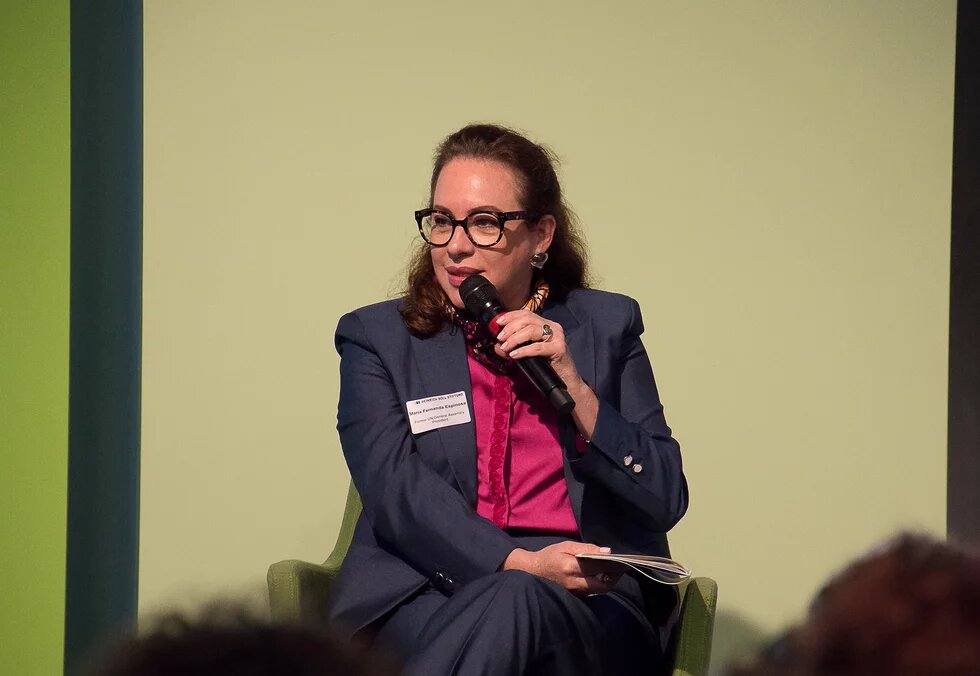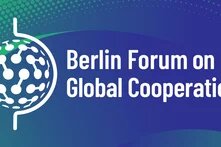High multipolarity, low multilateralism: In a world in crisis, María Fernanda Espinosa challenges our assumptions, critiques the global financial architecture, and offers a bold vision for the future of the United Nations.

This keynote speech was part of the Berlin Forum on Global Cooperation 2025 and can be listened to here.
Buenos días, good morning everybody!
The truth is that, yes, we need to talk. I heard the questions, and I have organized what I would like to share with you in three sections.
First, we need to revisit the analytic categories that we use. As a poet, I believe we should rethink the frameworks we rely on and go through an exercise of redefining, especially when we have spaces like this for honest conversation.
Second, I would like to zoom in on the current financial architecture. Resources and money are important, especially for countries like my own. But the way global finances are organized is a symptom of our realities. Behind the numbers, the financing gaps and the debt architecture, there are intentional political choices. And these are important to name.
Third, I want to share some thoughts on governance—on how we organize ourselves to govern our commons and our public goods. This goes beyond reviewing policies of any one country, because the world is organized in 194 countries, operating in a very complex and volatile global dynamic.
So let me start with a quote—and a small exercise for the room. The quote is: “The best way to guarantee one's national interest is through international cooperation.“
Who said that?
I was shocked to learn that this phrase was said by Henry Morgenthau Jr., the U.S. representative at the closing session of the Bretton Woods conference in 1944. I find it telling that—at the founding of the Bretton Woods institutions—this idea was voiced so clearly. The best way to guarantee national interest is through international cooperation. I think that's exactly what is at stake right now.
What we see is that governments and nations are reorganizing their priorities amid very profound economic and geopolitical uncertainty.
We already heard some context on why we're here. But perhaps let me quickly revisit. Context matters, not only for understanding what is happening (the forensics part of it), but for shaping our capacity to respond.
There are many ways to analyze what is happening. We already heard very important messages at the opening. What we see is that governments and nations are reorganizing their priorities amid very profound economic and geopolitical uncertainty. When we look at the World Bank reports, growth is expected to slow down from 1.8% to 1.4% in high-income economies—but in our part of the world, from 4.3% to 3.7%. These are not just numbers. They signal an economic downturn that is really hurting people on the ground.
At the same time, we also see a deep geopolitical fragmentation. We are not uniting in times of crisis. On the contrary, we see polarization, fragmentation, and disarray in our efforts to bring together our strength and respond to the world we're living in. Trade protectionism is on the rise, defense spending is increasing globally, and financial instability persists. Developing countries are facing escalating debt, reduced fiscal space, and the inability to make the investments needed in critical sectors such as health care, education, and climate action. We are also seeing extreme poverty. The rise in food insecurity is worsening across regions. And instead of an increase in development assistance, we are seeing cuts. Official development assistance declined more than 7% in 2024. This year, it seems it will decline even more.
A crisis of priorities, not resources
While the needs are increasing, development assistance is decreasing. This overall financial contraction does not exist in isolation. It is accompanied by policy shifts that scale back core development gains, deepening the fragility of the global development ecosystem even more.
But this is not a crisis of scarcity. We have the resources. We have the technologies. It is a crisis of priorities, a crisis of the political choices that we make. And when funding diminishes, so too does our collective ability to address poverty, improve health, and protect our planet. This challenges the very essence of collective action and multilateralism. I know that this might sound like a platitude, but every crisis can become an opportunity—depending on how we address it.
I have been closely following the negotiations of the upcoming Fourth UN Conference on Financing for Development, which Spain will host at the end of June. What is most interesting is not the outcome document that will be negotiated, but the conversations that are taking place around it. For the first time, we are hearing governments say that we need to unlock the 30 trillion dollars in global savings. Once again, this is not about scarcity. It is about how these resources are unlocked and channeled to the countries and communities that need them most.
We are living in a multipolar world with weak multilateral institutions and mechanisms.
I also hear about the urgent need to reform the international financial architecture. This is not just about filling gaps, it is about rethinking the economy of development. Rethinking development itself. And all of this is happening as we shape a new multipolar order. Yet multipolarity is not matched by the institutional and political structures that we need. We are living in a multipolar world with weak multilateral institutions and mechanisms. High multipolarity, low multilateralism. It’s a contradiction, but that is what we are experiencing.
The United Nations—I'm a little bit of a UN nerd, and Carlos has a history with the UN too— is seen as the epicenter of multilateralism and the organization itself is a vital global public good. But it is undergoing a profound crisis, currently lacks resources, political traction, and faces a significant performance challenge. A few weeks ago, a high-level official of the UN said: “We are undergoing a profound liquidity crisis.” And I replied: “Excuse me, this is not a liquidity crisis—this is a political crisis the organization is going through.”
Let me turn to the three clusters that I mentioned earlier.
Revisiting the analytical categories
First, as I mentioned, redefining the core analytical categories that we use. The first issue is moving away from the narrative of “aid” or “assistance” toward one of “cooperation”. That is why I really like the title of this forum—we need a new model of cooperation rooted in reciprocity, mutual accountability, and shared purpose. This means fostering circular cooperation models. Spain, for example, is taking this idea very seriously—promoting allyships, partnerships, innovation in all directions, within a dynamic ecosystem where all contribute and all benefit. This is central not only when we think about governing our commons, but also for addressing the issues that I mentioned before: eradicating poverty, inequalities, and the triple planetary crisis.
The second issue that we need to revisit is something that many intellectuals and practitioners are working on: the need to redefine the metrics of development to better respond to the new realities. We all know that the GDP mark is insufficient to capture the true health and well-being of our societies and ecosystems. The Beyond GDP conversation is gaining traction. The system of national accounts in many countries is being updated. Just this past May, a UN high-level expert group met to work precisely on this. This is not just a change in names—it's a change in how we understand wealth creation in societies. It means recognizing the Earth system that underpins life, accounting for air, water, biodiversity, and pollination. These are truly foundational assets that should be fully integrated into how we value economies.
And we must also better value the contribution of the so-called “Global South.”
We have the tools. For example, the UN's system of environmental economic accounting. And we must also better value the contribution of the so-called “Global South.” As a geographer myself, I can say that “Global South” does not correspond to how the world is organized today. I prefer the term “Global Majority.” Because we are the majority.
The contributions are vast: from labor to innovation, from carbon capture to biodiversity preservation, from indigenous knowledge to climate resilience and adaptation strategies. Countries like mine contribute not only to the global economy, but also to the global well-being of the people and planet.
Geography of financial flows needs to be re-discused
The third issue is the importance of understanding, rethinking, and revaluing labor—particularly care work. Not only care for other humans, but care for the environment. Environmental stewardship leads to value creation. Just consider this: 647 billion dollars in remittances have been sent to middle to low-income countries. These remittances have grown by 650% in the last 20 years. If you compare that to the 200 billion that multilateral development banks lend each year, it is telling. Or look at how many resources developing countries have transferred to the Global North. These account for 900 billion dollars, between 2000 and 2017, according to UNCTAD. And a recent study from the Autonomous University of Barcelona found that in just one year (2021-2022), the Global North imported 96 trillion hours of labor from the South, while exporting just 80 trillion. It's very important to see the financial fluxes—North-South, South-North. I think that the geography of financial flows needs to be re-discussed, because it serves the purpose of looking at alternatives to rethink and revisit the concept of the Global South.
The last issue is the need to redefine sovereignty. This is critical. Too often, we hear that national interest is in conflict with sovereignty, and that sovereignty is in conflict with collective action and multilateralism. But we must ask: What does cooperative sovereignty mean? What does sovereignty of peoples look like? We need to reclaim the idea of sovereignty in the service of humanity. The concept of network multilateralism, grounded in interdependence, is absolutely critical. This is not only a problem of political rhetoric; it is a problem of citizens defending their own space and protecting their well-being, alienating themselves from the role of global citizens. This disconnection is part of the core challenges that we face.
The current financial architecture
The second issue is the need to reshape the financing for development architecture. Who wins from financing for development? As I mentioned at the beginning, we need to move away from a logic of deficit thinking toward a comprehensive reform of the global financial system. This includes reorienting financial flows—with all the issues that I’ve outlined—to serve both human and planetary needs. It also means integrating the Sustainable Development Goals into all public and private financial planning. This requires reforming the multilateral development banks, both global and regional, not only in their working methods, but in the rules and governance. Consider this: the lending capacity of all multilateral banks is $300 billion. That is much less than the remittances sent by migrant workers each year.
We must also rethink debt. What we often hear in response to calls for debt relief and debt restructuring is “debt swaps”. But it is far more complex than that. Initiatives like the Debt Relief and Green and Inclusive Recovery Project have proposed concrete responses, not only to address debt, but also to define how different creditors should operate. Another key issue is the need for a global fiscal pact. Tax cooperation is critical—especially for addressing tax evasion and illicit financial flows. These issues are absolutely critical when we are thinking of a new financial architecture.
The goal should not be merely to fill the gaps, it should be a more systemic redesign. It is not only about providing liquidity to countries, it’s about rethinking the metrics, the instruments, the governance structures. And that is absolutely vital in a very volatile, complex, and unpredictable international environment.
Rethinking global governance
The third issue is the urgent need to rethink global governance. Perhaps the main challenge is: how do we govern interdependence in today's world? How do we protect national interests through global cooperation? What institutions, what rules, what mechanisms do we need?
Multilateralism is not a threat to sovereignty—it is its modern expression. And it bears repeating: global threats cannot be managed by national means alone. Regardless of GDP or territorial size, no country can do it alone. We need governance designs that protect national interest through cooperation—not despite it.
When I think about the future of the United Nations, the issues of legitimacy, capacity, accountability, and performance are absolutely critical to regain trust in global institutions and their ability to deliver for people on the ground. A reformed “United Nations 2.0” should be the anchor of this effort. We also need to value and mobilize regional integration mechanisms. I’m paying close attention, for example, to the BRICS Summit taking place in Brazil. Other regional integration mechanisms— such as the African Union, ASEAN, and CELAC in my own region—already exist, but they are underfunded and politically constrained.
Structural reform is not a utopian project; it is a strategic necessity. But of course, it requires political traction, citizens’ involvement, and public participation. The future of sovereignty is precisely about co-writing the rules of the world we want. And that's not a contradiction—it is the only path forward.
China, in particular, plays a critical role through its three major initiatives: the Belt and Road, development, and security.
At the heart of any renewed governance arrangements lies the issue of peace. We must recognize this clearly: the conflicts over resources, the rise in rearmament, the losses in development and peace-building—these are enormous. I strongly believe the United Nations must reclaim its role in preventive diplomacy, peacebuilding, and collective security, all within a more inclusive human security architecture.
To conclude, there is a new order in the making, with new alignments, evolving cooperation dynamics, and a greater role for the middle powers and regional blocs like the BRICS. China, in particular, plays a critical role through its three major initiatives: the Belt and Road, development, and security. This is gaining traction, especially in the developing world. China is a great funder of the United Nations system with 20% of the core budget. This creates room for new alliances and a renewed role for middle powers. In my opinion, it is a make-or-break moment for the UN. It is a very strong wake-up call, and a golden opportunity for the UN to reinvent itself.
Some call this “a new San Francisco moment.” There is a very vibrant movement out there of scholars, citizens, and governments pushing for structural reform. Let me mention two initiatives that I'm following closely. One is the Better Order Project, which is working to redesign the UN system. The other is the Second Charter Initiative, a group of people and now involving countries, including Brazil, to rethink and potentially revise the UN Charter itself.
Need for new spaces for partnerships and alliances
There is an opportunity now for the UN to gain trust and legitimacy. The so-called UN80 response, in my opinion, should not be about cost-cutting and merging organizations. It must go further. It must involve rethinking mandates, rebuilding traction, strengthening citizen engagement, and enhancing accountability. We have something in hand.
Yes, it is a very volatile, complex, unpredictable environment. But there is also a vibrant intellectual community around the world — and a group of countries— reimagining how the world is organized, creating new spaces for partnerships and alliances to redesign the world order. But there is no redesigning of a world order without citizens. And no reinvention of that world without engaged, responsible global citizens from around the world. And there is no reinventing without academia and thinkers. I'm very proud to say that I come from a region rich in productive intellectuals who are contributing actively to this moment of interregnum—this in-between moment that we are all responsible for.
Thank you again. I am looking forward to the discussion and the conversation ahead.


